Browse our range of reports and publications including performance and financial statement audit reports, assurance review reports, information reports and annual reports.
Regional Working Group on Environmental Auditing (17–19 September 2024)
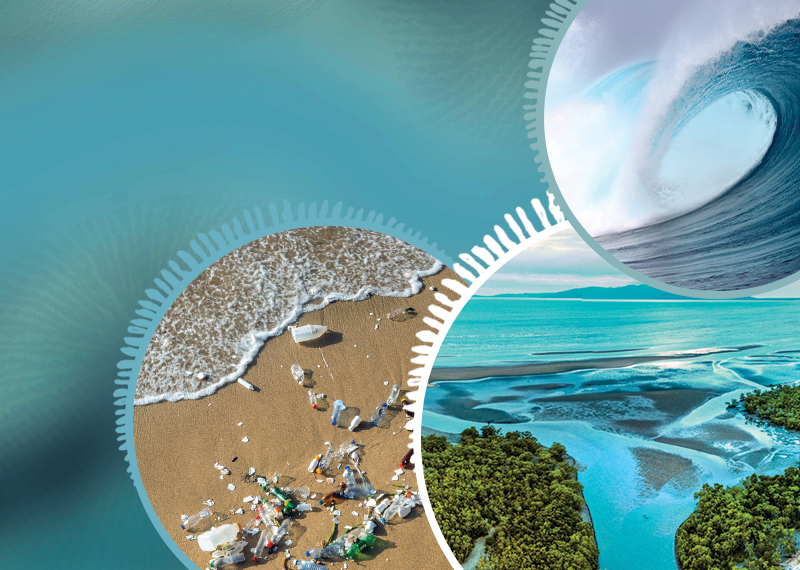
For any enquiries, please contact External.Relations@anao.gov.au
The Australian National Audit Office, in partnership with the Australian Capital Territory Audit Office hosted the 12th Meeting of the Pacific Association of Supreme Audit Institution’s (PASAI) Regional Working Group on Environmental Auditing. The meeting was held from 17-19 September 2024 in Canberra, Australia.
Conference information (historical)
The PASAI Regional Working Group on Environmental Auditing was formed in 2001 with the support and encouragement of the INTOSAI WGEA. The purpose of the grouping is to encourage and build capacity within PASAI for environmental audits.
For more information please visit the PASAI website https://www.pasai.org/, the INTOSAI Working Group on Environmental Auditing website https://wgea.org/regional/pasai-wgea/ or contact the regional coordinator Jonathan Keate at Jonathan.keate@oag.parliament.nz.
Documents
The text of the communique from the meeting is below. A copy of the opening address made by Ms Rona Mellor PSM, Deputy Auditor-General is at the Related documents on this page
Communiqué
12th Meeting of the PASAI Regional Working Group on Environmental Auditing Communiqué
The Australian National Audit Office (ANAO), in partnership with the Australian Capital Territory (ACT) Audit Office and the Pacific Association of Supreme Audit Institutions (PASAI), hosted the 12th meeting of the Regional Working Group on Environmental Auditing (RWGEA) from 17 to 19 September 2024 in Canberra, Australia. The hybrid event included participants from across the membership of PASAI and the Australasian Council of Auditors General (ACAG). The ANAO was also pleased to welcome participation from the International Organization of Supreme Audit Institutions’ (INTOSAI) Working Group on Environmental Auditing, namely representatives from SAI Finland and SAI Maldives. In total, 35 people participated in the event in person and up to 56 people participated online over the three days.
The event program was shaped around the theme auditing in the blue economy, which included two sub-themes: oceans and waterways, and climate change and natural disasters. This communiqué summarises the core themes and issues discussed at the meeting.
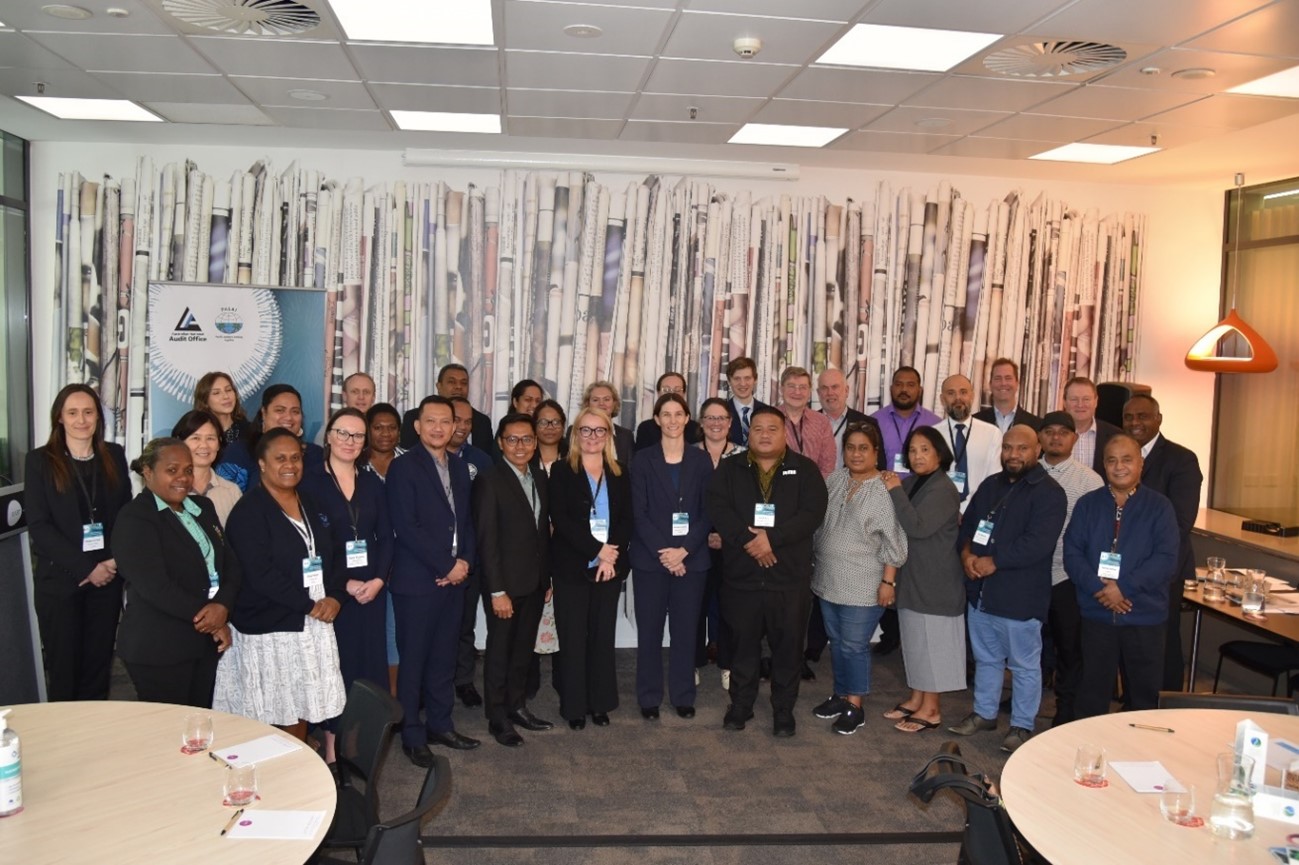
Day one
Day one introduced the theme of auditing in the blue economy and provided an opportunity for discussions on developments in the sector on this theme.
Proceedings commenced with a Welcome to Country from Senior Ngunnawal Elder Aunty Violet Sheridan. It was followed by opening remarks from:
- Ms Rona Mellor PSM, Acting Auditor-General for Australia; and
- Mr John Ryan, Secretary-General of the Pacific Association of Supreme Audit Institutions, and Controller and Auditor-General of New Zealand.
The keynote address was presented by Dr Filimon Manoni, the Pacific Ocean Commissioner, Office of the Pacific Ocean Commissioner, Pacific Islands Forum Secretariat. Dr Manoni highlighted the significance of the ocean and coastal seas to the Pacific way of life, and the connection that Pacific peoples have with the oceanic environment. Dr Manoni discussed the role of the Office of the Pacific Ocean Commissioner, including in relation to ocean governance and advocacy of regional ocean priority issues at the various regional and global levels. Dr Manoni also discussed the many challenges impacting the health and resilience of the ocean, including climate change impacts, pollution, and fisheries, and various international conventions designed to support a sustainable oceanic environment.
Following Dr Manoni’s address, Ms Jacqueline Hedditch (SAI Australia), facilitated a panel discussion on developments in public sector auditing related to the blue economy with Mr Mike Scott, Program Director, PASAI, Ms Jane Meade (SAI Australia), and Mr Mohamed Ibrahim Jaleel and Ms Khadeeja Afsala Adam (SAI Maldives). The panellists discussed developments and challenges in auditing the blue economy, including the complexity and interconnectedness of issues impacting the blue economy, the availability and accessibility of reliable data and expertise, and developments in climate and sustainability reporting.
Attendees were given the opportunity to workshop common issues and challenges in their jurisdictions around auditing the blue economy. Facilitated by Ms Casey Mazzarella and Ms Jemimah Hamilton (SAI Australia), attendees raised a range of challenges including access to subject matter experts, data collection and records management, and issues with the prioritisation of blue economy audits.
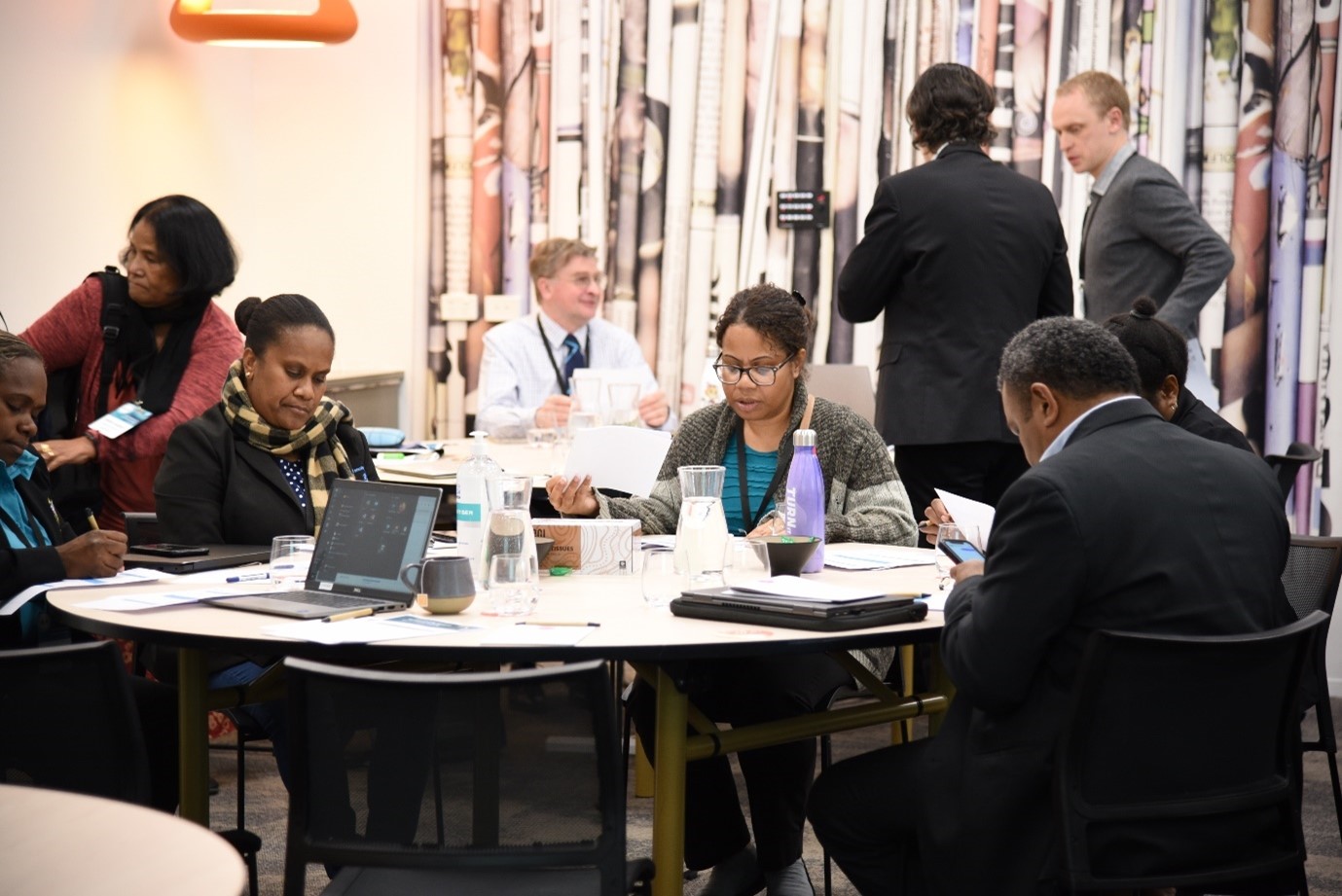
Day one also featured discussions on engaging with the legislature and its committees. Mr Brett Stanton, the Assistant Auditor-General of the ACT Audit Office, led a conversation with Dr Sophie Lewis, the ACT Commissioner for Sustainability and the Environment, on how independent bodies can engage and create meaningful impact with the parliament. Dr Lewis provided advice for auditors when briefing parliamentarians, and described the key challenges and successes she has experienced while engaging with parliamentarians in her role. Challenges identified by Dr Lewis included balancing the multiple interests of statutory office holders and entities approaching parliamentarians with a range of important issues, and the need for patience as it can take some time to see progress or action on recommendations. Dr Lewis noted that these changes took quite some time to occur, again emphasising the importance of patience when creating impact with the parliament.
Facilitated by Ms Sally Ramsey (SAI Australia), there was a panel discussion, featuring Mr Benjamin J.F. Cruz (Guam Office of Public Accountability), Ms Jenny Adams, Committee Secretary of the Joint Committee of Public Accounts and Audit, Mr Stephen Palethorpe, Committee Secretary of the Senate Environment and Communications Committee, and Mr Jonathan Keate, PASAI RWGEA Regional Coordinator, on the role of parliamentary committees and how audit offices can meaningfully engage with committee processes. The panellists provided an overview of the role, scope, and nature of dynamics within legislature across the different jurisdictions. They emphasised the value that audit reports provide to the legislature and to parliamentary committees. The panellists also noted the importance of presenting information in a concise and clear format to assist briefing parliamentary committees and balancing the need for awareness of the political context of a parliamentary committee while maintaining impartiality.
Day two
Day two explored auditing in the blue economy with a focus on oceans and waterways. Facilitated by Ms Jacquie Walton (SAI Australia), Ms Sarah Ransom from Australian Water Partnership and Dr Maxine Cooper, Chair of the ACT and Region Catchment Management Coordination Group, provided an overview of Pacific water partnerships and the challenges of cross-jurisdictional water governance in an audit context. Both panellists emphasised the value of partnerships and the implications of partnerships for audit work to allow collaborative problem solving and diversity of thought, knowledge and expertise.
Following, Ms Karen Wong (SAI New Zealand) facilitated a panel discussion with Ms Cathreen Mafi (SAI Tonga) and Ms Jacqueline Hedditch (SAI Australia) on recent audits of oceans and waterways. The panellists presented on common themes and lessons learned from blue economy audits undertaken by their SAIs. Key themes included: weaknesses in the management of probity and conflicts of interest, variability in the maturity of risk-based frameworks for the delivery of regulatory functions, and issues in implementation, monitoring and reporting on plans.
A further panel discussion was held on the topic of sustainable fisheries and featured presentations from Ms Miriama Naivalu (SAI Federated States of Micronesia), Mr Michael White (SAI Australia), and Mr Feisal (SAI Indonesia). The panellists provided an overview of the approach, objectives and methods of their audits into sustainable fisheries, and outlined findings, recommendations and lessons learned from the audits. The speakers emphasised the significant role that fisheries play in the economies of Pacific nations.
In the afternoon, attendees were given the opportunity to learn about audit quality across the region and participate in a practical seminar on performance auditing.
Mr Mike Scott, Director Performance Audit at PASAI, facilitated a panel discussion with the following representatives: Mr Charles Strickland (Queensland Audit Office), Mr Risiate Baba (SAI Fiji), and Ms Amelia Pomery (SAI Australia). The panellists explored audit quality and challenges in the context of environmental auditing. Common challenges included building internal subject matter knowledge; selecting, accessing and engaging external subject matter experts; auditing complex and potentially contested measures and reporting methodologies; new reporting frameworks; and the use of new audit methodologies.
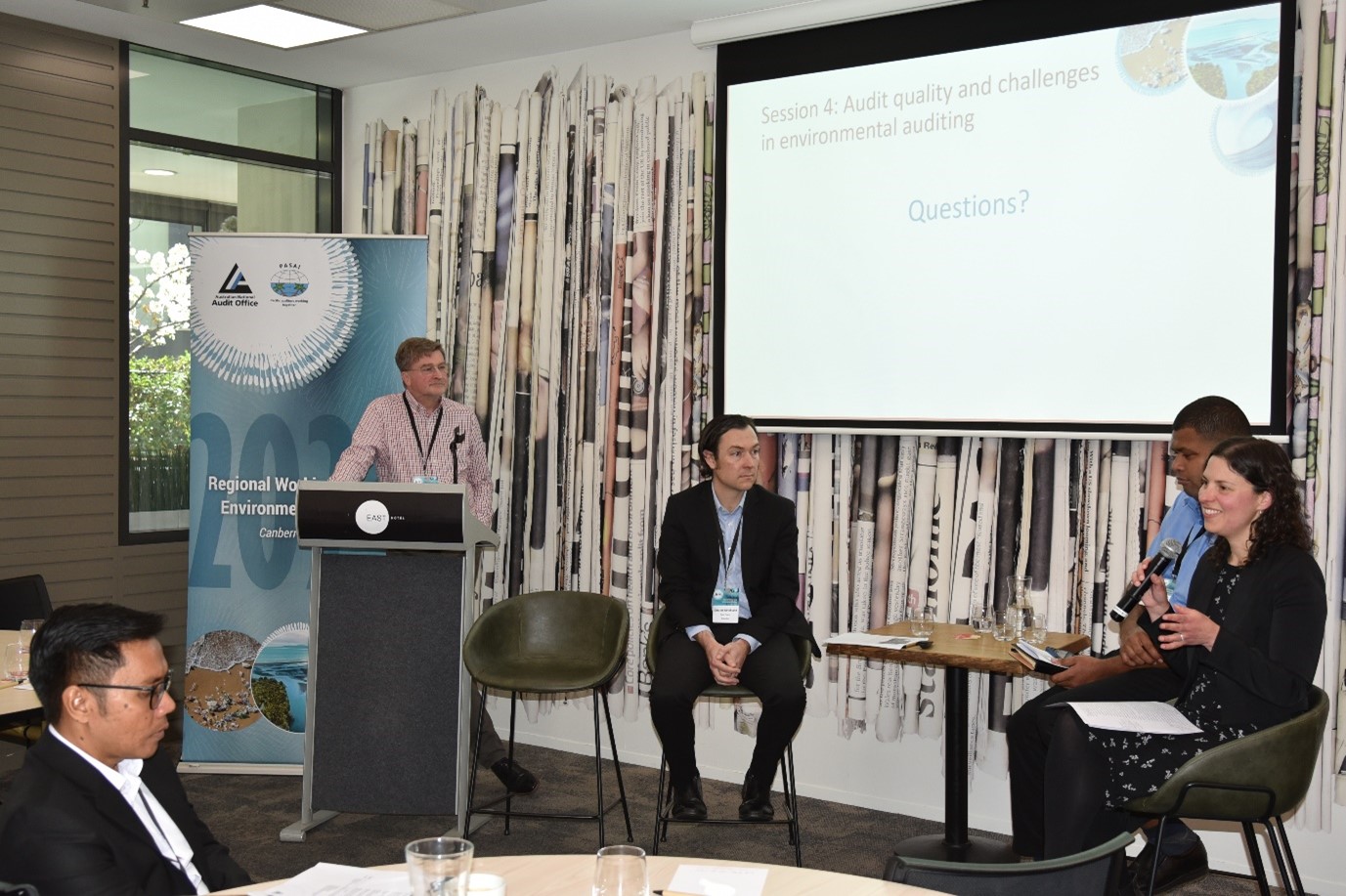
Dr Vivi Niemenmaa (SAI Finland) led a practical seminar focused on auditing climate action and scoping environmental audit topics. Dr Niemenmaa discussed how SAIs select audit topics, and why specific topics should be audited. Dr Niemenmaa noted the nexus between climate change mitigation and adaptation and highlighted the potential value in examining mitigation and adaptation together. Attendees worked together to brainstorm environmental audit topics, scoped their chosen audit topics and developed audit questions and criteria.
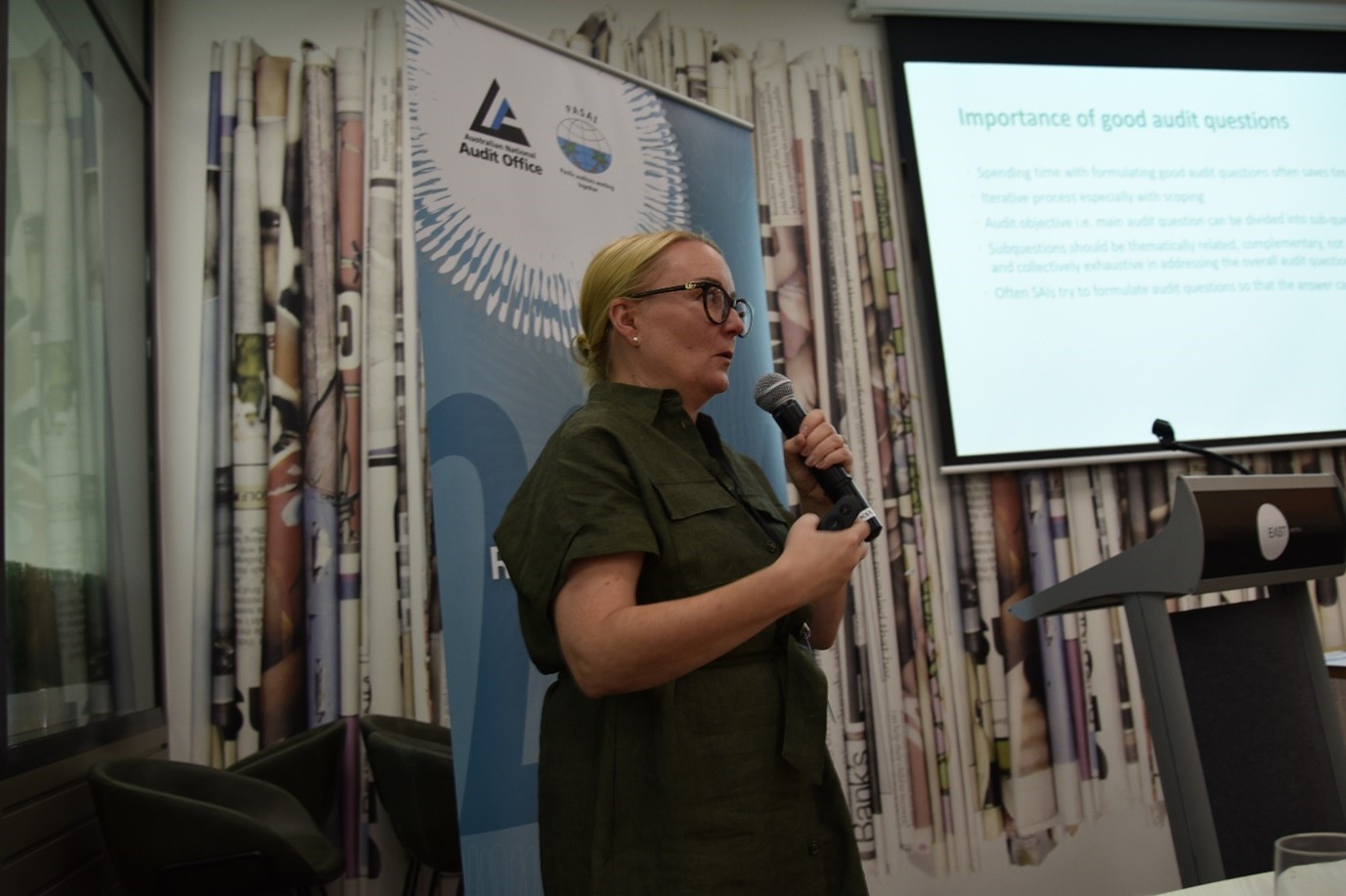
Day three
On day three, presentations were delivered on developments in the global environmental auditing community and in the Indo-Pacific region. There was also an exploration of auditing in the blue economy in the context of climate change and natural disasters.
Dr Vivi Niemenmaa provided an update on current themes and projects from INTOSAI’s Working Group on Environmental Auditing (WGEA). She highlighted themes and emerging issues from the WGEA Assembly (hosted in Finland in January 2024) including the need for auditors to take longer term perspectives and the value of using information sources including Indigenous ways of knowing and internationally agreed targets. Dr Niemenmaa also spoke about the value of collaborative projects which can help auditors to gain a better understanding of environmental issues and increase practical audit skills.
Similarly, Senior Auditors Mr Fery Irawan and Mr Feisal, from SAI Indonesia, presented on the INTOSAI WGEA Sustainability Reporting project being led by SAI Indonesia and SAI Thailand. Mr Irawan highlighted the importance and benefits of sustainability reporting in assisting governments to make more responsible decisions and allowing governments to become more accountable for their environmental impact. Challenges to sustainability reporting were outlined, including legal and regulatory challenges, challenges with engagement and expertise, and data and information challenges. Mr Feisal presented on SAI Indonesia’s Sustainability Report, published in 2020, which provided information on the economic, social and environmental impacts of SAI Indonesia’s operations, and outlined how the included topics were identified, prioritised, validated and reviewed. Mr Feisal also presented on SAI Indonesia’s experience reviewing the Indonesian government’s 2021 Voluntary National Review of Sustainable Development Goals.
Ms Torise Luagia (SAI Samoa), Mr Maludrik Maludrik (SAI Marshall Islands) and Mr Iefata Keli (SAI Tuvalu) presented on the progress of audits being conducted as part of the INTOSAI Development Initiative Cooperative Audit of Climate Change Adaptation Actions (CCAA). The session was facilitated by Mr Jonathan Keate, the Regional Working Group for Environmental Auditing Regional Coordinator. Emerging themes from preliminary findings across the CCAA audits included lack of strategy and coordination, poor implementation and issues with monitoring, issues with accessing and managing funding, and the sustainability and durability of changes. Success features of the CCAA audits included community involvement, site visits and visual evidence, and learning by doing.
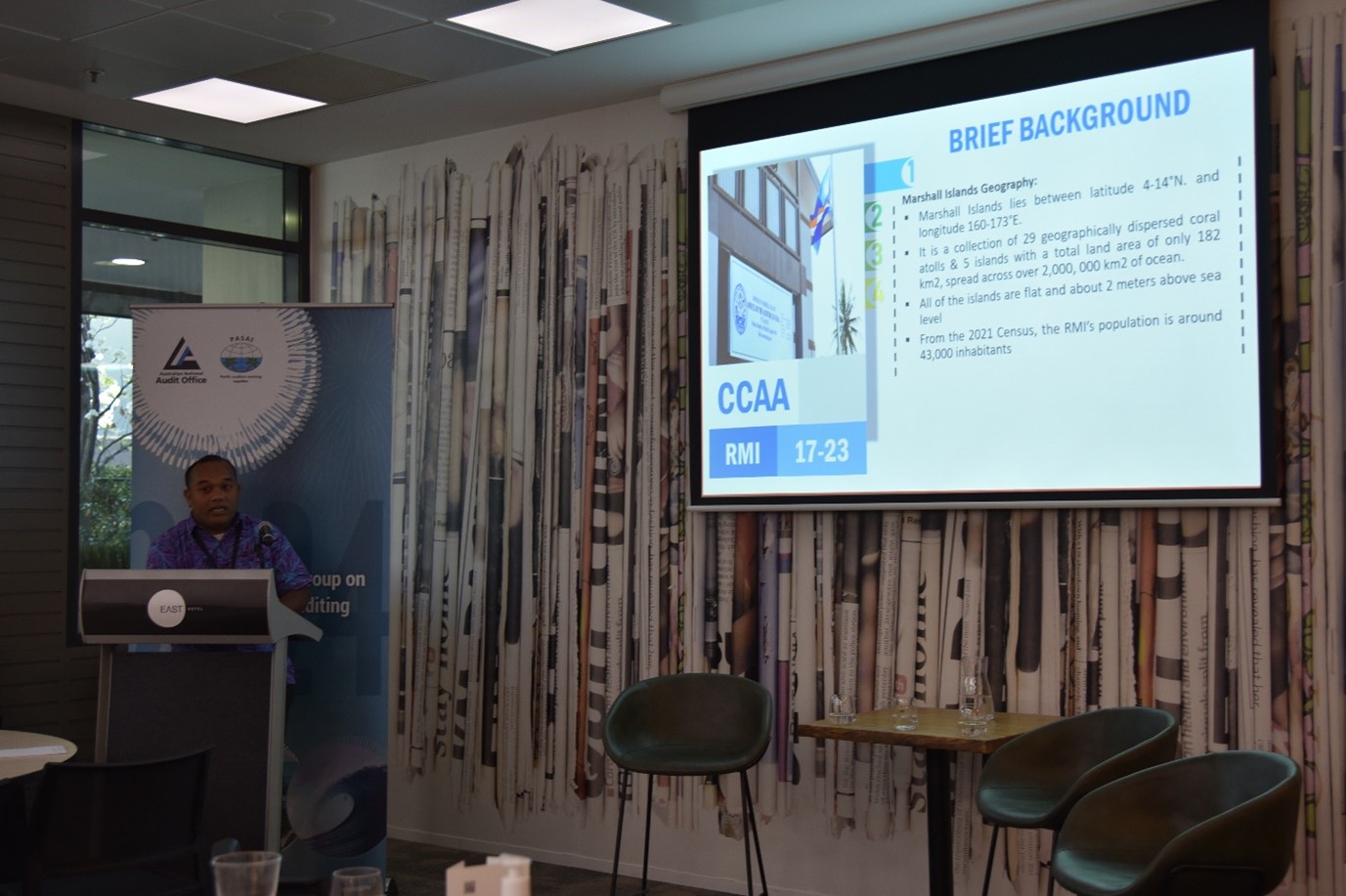
The formal proceedings concluded with a panel discussion on audits of natural disasters (facilitated by Dr Tanja Porter from the ACT Audit Office). Mr Jacques Wadrawane (New Caledonia Territorial Audit Office), Mr Andrew Anderson (New South Wales Audit Office), and Ms Corinne Horton (SAI Australia) discussed findings from their audits on natural disasters, common themes identified and advice for auditing natural disasters, including accommodating audits on natural disasters that transcend jurisdictional boundaries.
Excursion
23 attendees participated in a guided tour of the Great Southern Land exhibition at the National Museum of Australia. The exhibition explores Australia and its history and transformation over millennia, and how humans today are driving further change to Australia’s climate.